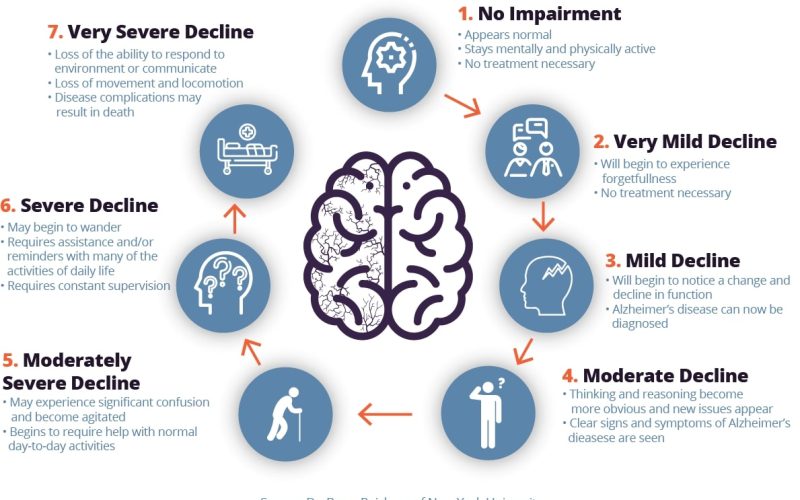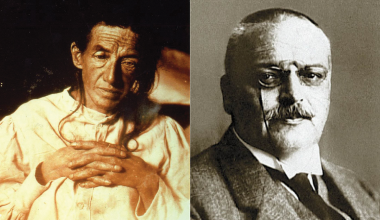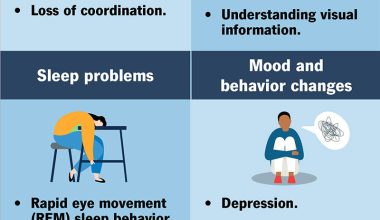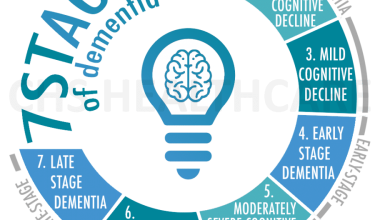As an Amazon Associate, I earn from qualifying purchases
The duration of the 7 stages of Alzheimer’s varies greatly among individuals. Early stages may last 2-4 years, while middle or later stages can extend between 2-10 years.
Alzheimer’s disease, a progressive neurodegenerative disorder, presents significant challenges for patients and caregivers alike. Characterized by a decline in cognitive functions such as memory, reasoning, and communication skills, the disease unfurls in seven distinct stages. From the initial pre-symptomatic phase to the severe end-stage of Alzheimer’s, the journey is deeply personal and the progression rate can differ drastically.
Recognizing each stage helps in understanding the disease’s trajectory and planning for appropriate care. Timely diagnosis and tailored interventions aim to improve the quality of life for those affected and manage symptoms effectively. As researchers continue to seek better treatments and potential cures, understanding the nuanced progression of Alzheimer’s remains pivotal in the overarching battle against this condition.

Credit: www.alzinfo.org
The Progression Of Alzheimer’s Disease
Understanding the progression of Alzheimer’s disease is critical. This brain disorder slowly destroys memory and thinking skills. Eventually, it affects the ability to carry out simple tasks. The journey through the stages of Alzheimer’s can vary widely among individuals. Knowing these stages helps caregivers plan for the changing needs of a person with Alzheimer’s.
Identifying The 7 Stages
The 7 stages of Alzheimer’s disease outline the typical pattern of decline. It starts with no visible symptoms and ends with very severe cognitive decline. Each stage is defined by symptoms and behaviors.
- No Impairment
- Very Mild Decline
- Mild Decline
- Moderate Decline
- Moderately Severe Decline
- Severe Decline
- Very Severe Decline
Detailed symptoms for each stage are crucial for doctors to provide the best care.
Factors Influencing Disease Progression
Several factors impact how quickly someone moves through the stages of Alzheimer’s. These factors include genetics, overall health, and age. Lifestyle factors like diet and exercise also play a role.
| Factor | Impact on Progression |
|---|---|
| Genetics | Can speed up or slow down progression. |
| Health | Existing conditions may accelerate decline. |
| Age | Older age is linked to quicker progression. |
| Lifestyle | Healthy habits could slow disease progression. |
Understanding these factors is key for supporting loved ones with Alzheimer’s.
Early-stage Alzheimer’s And Duration
Understanding the duration of Alzheimer’s early stages helps in planning and support. This disease progresses differently for each person. Early stages may be slow to change. Knowing this helps families prepare.
Stage 1: No Impairment
No noticeable symptoms occur in this stage. Alzheimer’s is not detectable and no memory problems or other symptoms are evident. Duration varies greatly, but changes in the brain may begin years before any signs.
Stage 2: Very Mild Decline
People might experience slight changes in memory or mood. Forgetting words or misplacing objects are common. This phase can last for years without major impacts on daily life.
Stage 3: Mild Decline
At this point, loved ones may notice memory or concentration issues. Organizational skills may struggle. This stage may last 2 to 7 years. Early diagnosis can be beneficial.
Mid-stage Alzheimer’s Timeline
Understanding the timeline of Alzheimer’s disease helps families prepare for the changes ahead. The mid-stages, often the longest phase, involve significant shifts in abilities and behavior. As we explore stages four and five, it’s crucial to grasp the typical durations and manifestations of these phases.
Stage 4: Moderate Decline
The fourth stage marks a turning point in Alzheimer’s progression with clear-cut symptoms. Here, we observe:
- Challenge handling finances
- Difficulty with travel
- Problems with complex tasks
This stage may last for two years. During this time, loved ones often need more help with daily life.
Stage 5: Moderately Severe Decline
By stage five, individuals require significant support. Key symptoms include:
- Confusion with time or place
- Decreased independence
- Inability to recall personal details
It’s common for this stage to span 1.5 to 2.5 years. Caregivers begin to take a more active role in daily routines.
It is important to note that these timelines vary. Each individual’s journey through Alzheimer’s disease is unique.
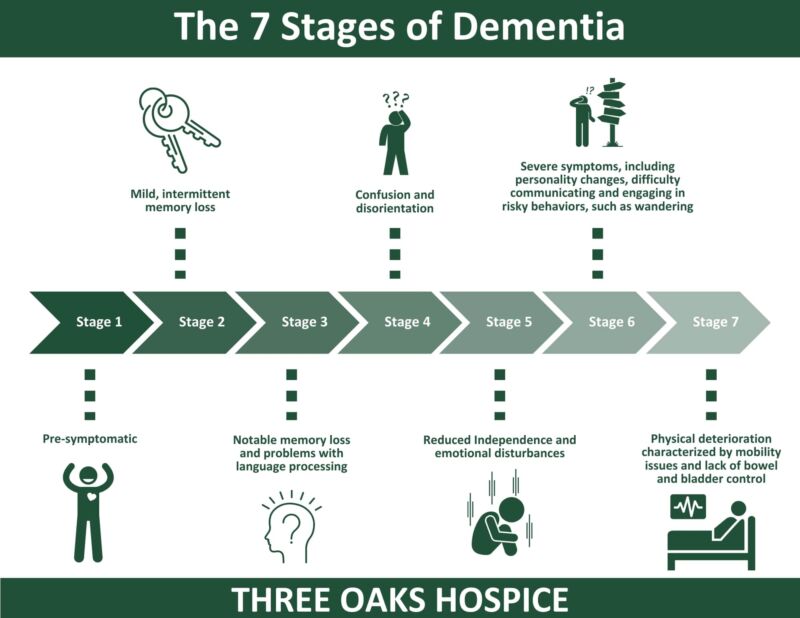
Credit: www.threeoakshospice.com
Late-stage Alzheimer’s And Expectancies
Late-Stage Alzheimer’s and expectancies touch upon a period where assistance becomes crucial. This phase marks significant changes in the life of an Alzheimer’s patient. Understanding the duration and what to expect in the late stages can offer invaluable support for caregivers and loved ones.
Stage 6: Severe Decline
In Stage 6, known as Severe Decline, Alzheimer’s patients need help with daily activities. This stage can last, on average, approximately 2.5 years. Patients may experience:
- Memory loss worsening
- Confusion about surroundings
- Difficulty recognizing faces
- Major personality changes
During this time, engaging in memory care activities can prove beneficial. They provide comfort and potentially slow down the decline.
Stage 7: Very Severe Decline
Stage 7 represents the final phase, Very Severe Decline. Patients lose the ability to respond to their environment or carry on a conversation. Eventually, they may not be able to control movement. The typical duration of Stage 7 is around 1.5 to 2.5 years. Key changes include:
- Loss of speech and communication
- Needing full-time assistance
- Potential immobility
Care during this stage focuses on providing comfort, dignity, and quality of life. Loved ones often consider palliative or hospice care suitable in this stage.
Coping With Alzheimer’s Progression
Understanding Alzheimer’s progression is key to managing the condition. The disease typically moves through seven stages. Each stage can last from a few months to several years. Knowing what to expect gives caregivers the ability to prepare for the challenges ahead. Let’s delve into effective ways to handle this journey.
Support For Caregivers
Caregivers need a solid support system to navigate the demands of Alzheimer’s. A combination of personal, community, and professional networks can provide this. Here’s what can help:
- Join local support groups to connect with those in similar situations.
- Seek respite care services for necessary breaks.
- Consult with healthcare professionals regularly.
Remember, self-care is crucial. Eating well, exercising, and resting are non-negotiable for caregivers.
Resources And Therapies
Various resources and therapies can significantly benefit individuals with Alzheimer’s. Cognitive stimulation, physical activities, and consistent routines offer comfort. Here are more options:
- Explore music and art therapy to boost mood and cognitive function.
- Look into occupational therapy for assistance with daily tasks.
- Utilize memory clinics for specialized care plans.
Some technological tools can also provide assistance. Simple devices like GPS trackers and electronic pill reminders aid in safety and medication management.
Remember, each journey through Alzheimer’s is unique. Tailor your approach to your loved one’s specific needs for the best possible quality of life at every stage.

Credit: twitter.com
Research And Future Outlook
Understanding the various stages of Alzheimer’s helps us prepare for the journey ahead. Each stage’s length is unpredictable and varies from person to person. Research and future outlook in the fight against Alzheimer’s show promise. Scientists tirelessly seek new insights. This could lead to more effective treatments. Our hope for those affected by Alzheimer’s continues to grow.
Emerging Treatments
Scientists are always working on new therapies. Bold new drugs are in development. These aim to slow or stop the progression of Alzheimer’s. Current research includes:
- Medications to reduce brain inflammation.
- Antibodies that target the disease’s proteins.
- Drugs that aim to protect brain cells.
Each breakthrough brings us closer to a cure. Clinical trials continue to test the safety and effectiveness of these treatments.
The Horizon Of Alzheimer’s Care
The future of Alzheimer’s care is bright. Advancements in technology may lead to better diagnosis and care. Families can expect:
- Improved diagnostic tools for earlier detection.
- Personalized treatments based on genetic profiling.
- Supportive therapies that enhance quality of life.
Technology, like wearable devices, could monitor symptoms. This helps with patient care. Support networks for caregivers will also expand. The next decade could redefine living with Alzheimer’s.
Frequently Asked Questions Of How Long Do The 7 Stages Of Alzheimer’s Last
How Long Can You Live In Stage 7 Of Alzheimer’s?
Individuals with Stage 7 Alzheimer’s typically live around 1. 5 to 2. 5 years, but survival can vary based on health factors and care quality.
How Do You Know What Stage Of Alzheimer’s You Are In?
To determine the Alzheimer’s stage, observe symptoms and consult a healthcare professional for assessment and diagnosis. They use cognitive tests and medical imaging to identify progression.
Which Stage Of Alzheimer’s Lasts The Longest?
The middle stage, also called moderate Alzheimer’s, typically lasts the longest of the disease’s three stages.
How Fast Does Alzheimer’s Usually Progress?
Alzheimer’s disease typically progresses over several years, often ranging from 2 to 20 years. Generally, symptoms gradually worsen over time, impacting memory, reasoning, and function. Rate of progression varies considerably among individuals.
Conclusion
Understanding the duration of Alzheimer’s stages helps prepare for the journey ahead. Each stage can vary widely in length from person to person. Embrace support systems and medical guidance to navigate these changes. Remember, early diagnosis and care planning can significantly improve quality of life.
Stay informed and compassionate throughout.
As an Amazon Associate, I earn from qualifying purchases
